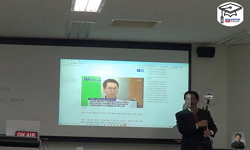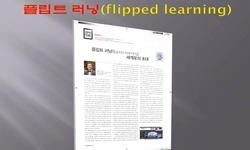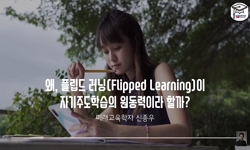The purpose of this study is to identify core elements required of instruction consulting and to develop a systematic consulting procedure for successful Flipped Learning. The main contents of this study to achieve its purpose are as follows. First, c...
http://chineseinput.net/에서 pinyin(병음)방식으로 중국어를 변환할 수 있습니다.
변환된 중국어를 복사하여 사용하시면 됩니다.
- 中文 을 입력하시려면 zhongwen을 입력하시고 space를누르시면됩니다.
- 北京 을 입력하시려면 beijing을 입력하시고 space를 누르시면 됩니다.

성공적인 Flipped Learning을 위한 수업컨설팅 요소 및 절차연구 = A Study on Elements and Procedure of Instruction Consulting for Successful Flipped Learning
한글로보기https://www.riss.kr/link?id=A103651254
- 저자
- 발행기관
- 학술지명
- 권호사항
-
발행연도
2016
-
작성언어
Korean
- 주제어
-
등재정보
KCI등재
-
자료형태
학술저널
-
수록면
76-82(7쪽)
-
KCI 피인용횟수
22
- DOI식별코드
- 제공처
-
0
상세조회 -
0
다운로드
부가정보
다국어 초록 (Multilingual Abstract)
The purpose of this study is to identify core elements required of instruction consulting and to develop a systematic consulting procedure for successful Flipped Learning. The main contents of this study to achieve its purpose are as follows. First, core elements required of consulting are deduced by analyzing cases of instruction implemented with Flipped Learning. Second, consulting procedure is constructed based on core consulting elements of Flipped Learning. Based on the study results, the 3P process is suggested as the elements and procedure of instruction consulting for Flipped Learning. The 3P process has the following characteristics. The first stage Preparation involves guiding students to have an objective viewpoint about the lesson beginning with building a relationship with the instructor.
Also, a lesson plan and source materials for lesson are selected and developed. The second stage Performance involves implementing lesson coaching oriented towards cooperative problem-solving to find better direction. The last stage Post-review involves introspection necessary for continuous quality improvement of lessons. The validity of the instruction consulting elements for Flipped Learning applied to deduce the aforementioned results has been verified after specialist review and field application.
참고문헌 (Reference)
1 주길홍, "효율적인 플립트러닝을 위한 e-PBL 교수학습모형 연구" 3 (3): 47-53, 2015
2 이소현, "학습자 활동 중심의 스테이션 학습법 -한글 자모 학습을 중심으로-" 국제한국어교육학회 26 (26): 267-297, 2015
3 이희숙, "플립러닝 학습이 학습동기 및 학업성취도에 미치는 효과에 관한 연구" 한국컴퓨터교육학회 18 (18): 47-57, 2015
4 이동엽, "플립드 러닝(Flipped Learning) 교수학습 설계모형 탐구" 한국디지털정책학회 11 (11): 83-92, 2013
5 정명기, "초등 영어 스마트 교육을 위한 플립드 교수학습모형의 개발 및 적용" 한국교원대학교 대학원 2015
6 배정훈, "스마트디바이스와 Flipped Learning 을 활용한국내 대기업 연수원 교육" 2 : 14-15, 2015
7 정영식, "스마트 교실을 활용한 ‘뒤집힌 교수학습모형’ 개발" 한국정보교육학회 19 (19): 175-186, 2015
8 이재경, "수업컨설팅 분석 준거에 의한대학 수업 사례 분석 결과 및 개선 방안 탐색" 학습자중심교과교육학회 15 (15): 663-689, 2015
9 한형종, "대학 역전학습 온·오프라인 연계 설계전략에 관한 연구" 한국교육공학회 31 (31): 1-38, 2015
10 최정임, "국내 수업컨설팅 연구동향 분석" 한국교육공학회 31 (31): 95-127, 2015
1 주길홍, "효율적인 플립트러닝을 위한 e-PBL 교수학습모형 연구" 3 (3): 47-53, 2015
2 이소현, "학습자 활동 중심의 스테이션 학습법 -한글 자모 학습을 중심으로-" 국제한국어교육학회 26 (26): 267-297, 2015
3 이희숙, "플립러닝 학습이 학습동기 및 학업성취도에 미치는 효과에 관한 연구" 한국컴퓨터교육학회 18 (18): 47-57, 2015
4 이동엽, "플립드 러닝(Flipped Learning) 교수학습 설계모형 탐구" 한국디지털정책학회 11 (11): 83-92, 2013
5 정명기, "초등 영어 스마트 교육을 위한 플립드 교수학습모형의 개발 및 적용" 한국교원대학교 대학원 2015
6 배정훈, "스마트디바이스와 Flipped Learning 을 활용한국내 대기업 연수원 교육" 2 : 14-15, 2015
7 정영식, "스마트 교실을 활용한 ‘뒤집힌 교수학습모형’ 개발" 한국정보교육학회 19 (19): 175-186, 2015
8 이재경, "수업컨설팅 분석 준거에 의한대학 수업 사례 분석 결과 및 개선 방안 탐색" 학습자중심교과교육학회 15 (15): 663-689, 2015
9 한형종, "대학 역전학습 온·오프라인 연계 설계전략에 관한 연구" 한국교육공학회 31 (31): 1-38, 2015
10 최정임, "국내 수업컨설팅 연구동향 분석" 한국교육공학회 31 (31): 95-127, 2015
11 정영란, "교수자의 성찰적 실천에 기반한 이러닝 수업컨설팅이 수업에 미치는 영향" 한국교육정보미디어학회 20 (20): 275-301, 2014
12 김광선, "공학교육 패러다임 변화의 방향" 22 (22): 2-9, 2015
13 최정빈, "공과대학의 Flipped Learning 교수학습 모형 개발 및 교과운영사례" 한국공학교육학회 18 (18): 77-88, 2015
14 박태정, "거꾸로 교실(Flipped Classroom)의 교육적 활용가능성 탐색을 위한 교사 인식 조사" 한국컴퓨터교육학회 18 (18): 81-97, 2015
15 박상준, "거꾸로 교실 모형의 개발과 적용 사례의 연구 - 예비교사 교육에의 적용 결과를 중심으로 -" 한국사회교과교육학회 22 (22): 1-21, 2015
16 Beach, R., "Using Digital Tools to Foster Social Practices Contributing to Connected Learning" 2015
17 Roseth, C. J., "Promoting early adolescents’achievement and peer relationships, The effects of cooperative, competitive, and individualistic goal structures" 134 : 223-246, 2008
18 Lori, O., "Promoting Active Learning through the Flipped Classroom Model" IGI Global 47-70, 2013
19 Enfield, J., "Looking at the impact of the flipped classroom model of instruction on undergraduate multimedia students at CSUN" 57 (57): 14-27, 2013
20 Papadopoulos, C., "Implementing an inverted classroom model in engineering statistics, Initial results. American Society for Engineering Statistics" 2010
21 Strayer, J. F., "How learning in an inverted classroom influences cooperation, innovation and task orientation" 15 : 171-193, 2012
22 Warter-Perez, N., "Flipping the classroom, How to embed inquiry and design projects into a digital engineering lecture" 2012
23 Davies, R. S., "Flipping the classroom and instructional technology integration in a college-level information systems spreadsheet course" 61 : 563-583, 2013
24 조일현, "Flipped MOOC와 학습분석학을 활용한 기업교육 혁신 모델" 2 : 1-8, 2015
25 조일현, "Flipped MOOC 와 빅데이터를 활용한 기업교육 혁신 방법론" 2 : 6-, 2015
26 Luan, Y. Y., "Discussion about the Application of MOOC in Engineering Education" 2015
27 Wong, S. Y., "Design Model for Integrating Learning Activity Management System (LAMS), Massive Open Online Courses (MOOC)and Flipped Classroom in Taylor’s Integrated Moodle e-Learning System (TIMeS)" 379-387, 2015
28 Johnson, D. W., "Creative controversy, Intellectual challenge in the classroom" Interaction Book Company 1995
29 Slavin, R. E., "Cooperative learning, Theory, research, and practice" Allyn and Bacon 1995
30 Bae, Y, "A Study on Comparison of Attitude and Problem Solving Ability in Students and Teachers through Global Connected Learning Based on Smart Education" 2015
동일학술지(권/호) 다른 논문
-
산업체 현장실습 운영 현황 분석을 통한 개선 방안에 관한 연구
- 한국공학교육학회
- 박경우
- 2016
- KCI등재
-
- 한국공학교육학회
- 손호재
- 2016
- KCI등재
-
레고 마인드스톰 NXT를 활용한 기초설계 교과목에서의 효과적인 공학설계과제 선정방안 연구
- 한국공학교육학회
- 신연순
- 2016
- KCI등재
-
- 한국공학교육학회
- 한경희
- 2016
- KCI등재
분석정보
인용정보 인용지수 설명보기
학술지 이력
| 연월일 | 이력구분 | 이력상세 | 등재구분 |
|---|---|---|---|
| 2022 | 평가예정 | 재인증평가 신청대상 (재인증) | |
| 2019-01-01 | 평가 | 등재학술지 유지 (계속평가) |  |
| 2016-01-01 | 평가 | 등재학술지 유지 (계속평가) |  |
| 2012-01-01 | 평가 | 등재학술지 유지 (등재유지) |  |
| 2009-01-01 | 평가 | 등재학술지 선정 (등재후보2차) |  |
| 2008-01-01 | 평가 | 등재후보 1차 PASS (등재후보1차) |  |
| 2006-07-21 | 학회명변경 | 한글명 : 한국공학교육기술학회 -> 한국공학교육학회영문명 : Korean Society For Engineering Education & Technology Transfer -> Korean Society for Engineering Education |  |
| 2006-01-01 | 평가 | 등재후보학술지 선정 (신규평가) |  |
학술지 인용정보
| 기준연도 | WOS-KCI 통합IF(2년) | KCIF(2년) | KCIF(3년) |
|---|---|---|---|
| 2016 | 1.01 | 1.01 | 1.06 |
| KCIF(4년) | KCIF(5년) | 중심성지수(3년) | 즉시성지수 |
| 0.85 | 0.88 | 1.334 | 0.31 |





 KCI
KCI 스콜라
스콜라






